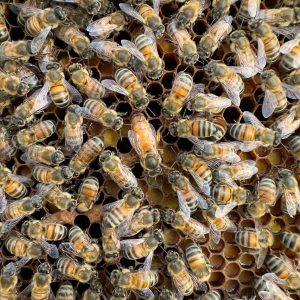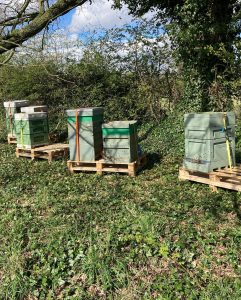
A Salford beekeeper has called for more communication following the environmental watchdog announcement on banned pesticides.
The warning has come from the watchdogs following the belief that the Government may have breached environmental laws when it allowed the use of a banned pesticide that is harmful to bees.
The Office for Environmental Protection (OEP) is investigating the Environment Department (Defra)’s. For the emergency authorisation of the neonicotinoid pesticide Thiamethoxam for use on sugar beet seeds in 2023 and 2024.
As part of the investigation, which began in June, the OEP issued an “information notice” to Defra, as they outlined alleged failures to comply with several environmental regulations.
The notice details the seriousness of the issue and requests specific information related to the allegations, with Defra being given until January 28 2025 to formally respond.
Thiamethoxam, a pesticide that is highly toxic to bees, was banned in the UK and EU in 2018.
However, it was approved for emergency use in the UK for the fourth consecutive year in January, with the Government stating it was necessary for sugar beet due to a risk that could not be controlled by other means.
The use of the pesticides has caused a greater concern, and this has been echoed by Salford beekeeper Dan Cook, the owner of Dan and the Bees,has over 60 colonies around Salford and neighbouring farms.
 And with harmful pesticides being used, he has called for an improvement in communication to protect bee colonies up and down the country.
And with harmful pesticides being used, he has called for an improvement in communication to protect bee colonies up and down the country.
With the beekeeper urging that communication should be set up and allow “some form of centralised reporting system.”
Dan continued by adding: “Somewhere farmers can actively update beekeepers when they’re going to use pesticides or chemicals. These pesticides might not be lethal but could still alter bee behaviour.”
The pesticide is used by farmers to combat aphids that spread the beet yellows virus, and the Government argued it was essential for safeguarding farmers’ livelihoods.
Dan, despite being an inner city beekeeper, has seen the effect of pesticides on his colonies: “I’ve had colonies collapse the bees were behaving strangely for a couple of days. Then their tongues were sticking out, a sign of poisoning.”
This decision has sparked outrage from environmental groups, who have condemned it as a “death blow” to bee populations.
The OEP is investigating whether the decision-making process adhered to the “precautionary principle,” which is a key environmental safeguard aimed at managing risks to the environment when there is uncertainty about potential harm.
The watchdog is also examining whether the Government met its obligations to protect nature.
Despite this, beekeepers like Dan understand the struggles farmers face, with the used pesticides beinf a necessity for farmers to protect their livelihoods.
He continued: “I do sympathise with the farmers on this because they have to make a living. Sugar beets are a fairly lucrative crop for most farmers.”
 The worry of the pesticides effect isn’t just on honey bees, and could have a greater impact on the whole food chain and ecological system.
The worry of the pesticides effect isn’t just on honey bees, and could have a greater impact on the whole food chain and ecological system.
As Dan continued: “The worry is not just honey bees but smaller pollinators. They might not survive even at reduced toxicity levels, destabilising the local ecology.”
While Helen Venn, the OEP’s chief regulatory officer, said: “The investigation is focused on whether the necessary assessments and considerations were carried out.
“In line with the law when the emergency authorisations were granted. Rather than questioning the decisions themselves.”
In terms of viable alternatives to pesticides, which there are few, Dan raised a further question of financial support from government.
“Are resources going to be put towards that? Who’s going to pay for it – the industry or the government? Those are questions that farmers and beekeepers are waiting to see answered.”
The investigation follows a complaint from environmental legal charity ClientEarth.
Meanwhile, the conservation groups have highlighted that analysis of official data shows neonicotinoids were detected in 85% of rivers tested in England, that are raising concerns about the impact on aquatic insects and the wider food chain.
Areas with high concentrations of sugar beet farming were found to have the highest levels of contamination, according to analysis by The Rivers Trust and Wildlife and Countryside Link.
In response to the OEP’s announcement, a Defra spokesperson said: “This Government has made it clear that we will review existing policies to ban the use of neonicotinoid pesticides that pose a threat to bees and other vital pollinators.”














